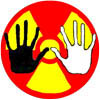Against a background of strong community protest to the continuing government and industry push for an expanded nuclear sector in Australia, the Australian Nuclear Free Alliance (ANFA) held its 17th annual gathering of Aboriginal, environmental and public health representatives who share common concerns over the adverse impacts of the nuclear industry and a common aspiration for a future free of nuclear threats.
The 2014 ANFA meeting was held on Arrernte country in Alice Springs with representatives from the following nations, communities and organisations: Arabunna, Arrernte, Koara, Kokatha Mula, Larrakia, Luritja, Ngaanyatjarra, Tjiwarl, TI Meriam, Warlpiri, Waramungu, Warlmanpa, Wiradjuri, Wongutha, Yankunytjatjara.
Anti-Nuclear Alliance of WA, Arid Lands Environment Centre, Australian Conservation Foundation, Beyond Nuclear Initiative, Conservation Council WA, Environment Centre NT, Freedom Flotilla, Friends of the Earth (Brisbane and Melbourne), Indonesian Greens, International Campaign to Abolish Nuclear Weapons, Keep Queensland Nuclear Free, Medical Association for the Prevention of War, Nuclear Operations Watch Port Adelaide, Public Health Association Australia (NT Branch), Uranium Free NSW, West Papua.
Radioactive Waste
The ANFA meeting celebrated and acknowledged the seven-year campaign against a planned radioactive waste dump at Muckaty – an important human and environmental rights victory. Many people from Tennant Creek expressed thanks to ANFA for the strong support and solidarity over the years.
Community representatives shared concerns and experiences about the divisive impacts of the federal government’s approach to waste management. Continuing to pursue only remote dumping options further exploits disadvantaged communities. The meeting endorsed a national statement calling for an independent National Commission into responsible radioactive waste management based on science and evidence instead of a continuation of the flawed and failed process of targeting remote communities.
Uranium mining
Australian uranium fuelled the Fukushima disaster but there is ongoing pressure for new uranium mines in Western Australia, the Northern Territory, South Australia, Queensland and exploration threats in New South Wales. ANFA condemned the federal and state governments as out of step with the broad opposition to uranium mining across many communities and organisations. The meeting discussed specific action plans to target uranium mining projects across Australia.
Mine Rehabilitation
The meeting heard of the failures of rehabilitation of uranium mines and called for the national adoption and enforcement of the standard applied at the Ranger mine in Kakadu that requires radioactive mine tailings to be isolated from the environment for no less than ten thousand years.
Women’s Health
The meeting heard personal stories and long history of disease and impacts from the nuclear industry, including intergenerational sickness and mental health issues. Base-line studies from the past were not done but should be demanded for any proposed new projects for animals, plants, bush foods and people. There is a need to do healing: the pain and hurt caused by nuclear impacts will always be there but we should support each other through healing and engage our community medical services in collecting data and tracking impacts.
Weapons
The meeting heard that around 40,000 rounds of depleted uranium weapons have been deployed in Australian military training exercises. This raises serious concerns about where they were used and any subsequent health impacts from these weapons. We recognise the intergenerational health impacts from nuclear weapons testing as well as the documented use and impacts of depleted uranium weapons. The meeting called for all uranium weapons and nuclear weapons to be banned.
Rare Earths
The mining and refining of Rare Earth Elements (REE’s) was discussed. There is a need for roundtable discussion of stakeholders in the nuclear free, climate and renewable energy sectors to discuss the role of REE’s in renewable energy technologies such as wind and solar given that mining these elements involves the generation of radioactive uranium and thorium waste.
Land Councils
There was strong concern about the function of Aboriginal Land Councils in different states and territories. The meeting called for greater openess to ensure such bodies represent the wishes of Aboriginal people in their region. There were deep concerns expressed that full consultation does not always happen and ANFA representatives will be seeking to address these issues within their particular Land Councils.
ANFA Network
ANFA representatives in each states and territory committed to building the ANFA network and sourcing funds to produce and distribute resources needed for grassroots community education on nuclear issues.
In the shadow of Fukushima there can be no nuclear business as usual and meeting representatives reaffirmed their commitment to actively advance a nuclear free Australia through involvement in ANFA, their communities and organisations.

